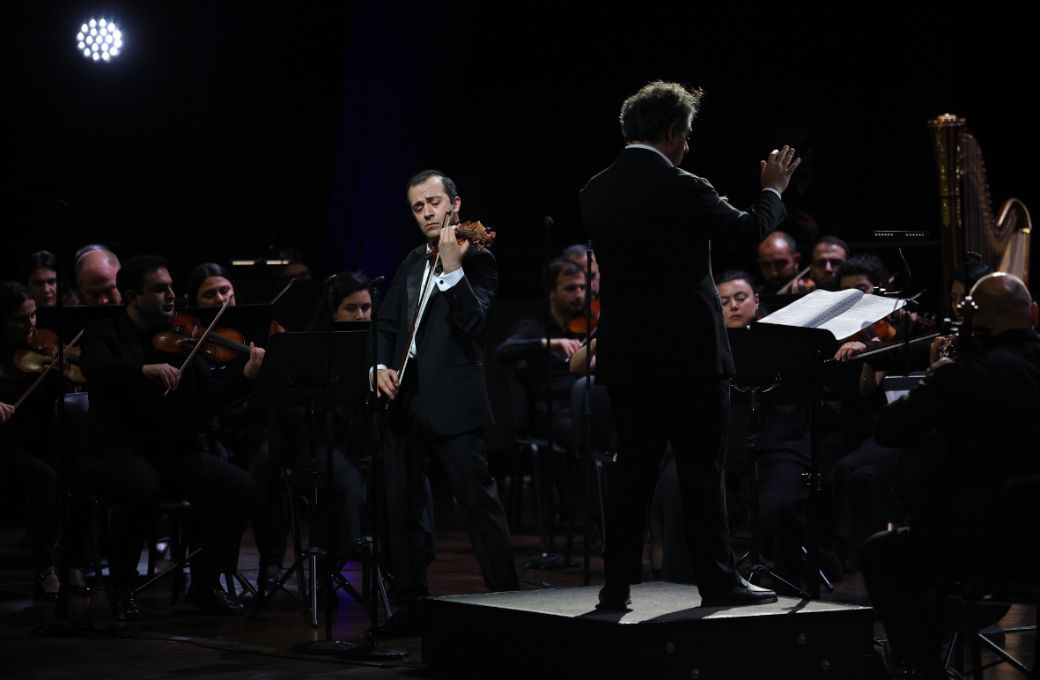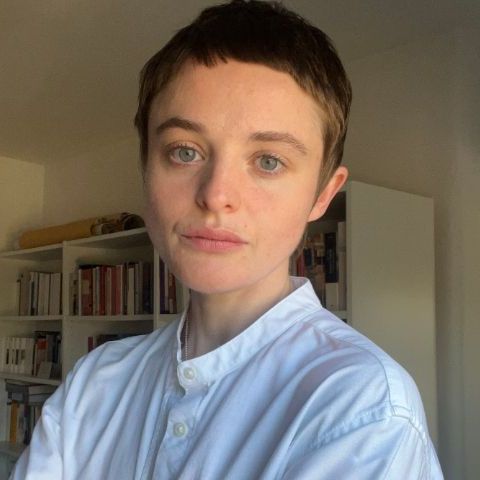The theatre of the Zabeel Saray hotel, a five-star resort perched on the southern frond of Dubai’s Palm Jumeirah, is not a usual classical music competition venue. Judging from the plasma screens in the lobby, its boards are more regularly trodden by sequinned dance troupes and Gulf comedians than students of Juilliard or laureates of the Queen Elisabeth Competition. But little about the inaugural final of the Classic Violin Olympus could be described as usual. Over six nights at the end of April, twelve violinists from a wide range of backgrounds and ages competed for a first prize of €200,000 – with each already guaranteed €10,000 by virtue of their position as finalists. It was the conclusion of a two-year process, which had funnelled musicians through a series of preliminary stages held in Rome, London, Tokyo, New York, Vienna and Dubai, to perform in a testing format with the aid of the Armenian State Symphony Orchestra and the Madrid Philharmonic.

One of competition’s distinctive elements was the absence of an upper age limit for participants, a feature which gave the first night’s performances by Boris Brovtsyn (48), Soyoung Yoon (40), Andrei Baranov (39) and Xiao Wang (38) a feeling closer to that of a masterclass than a competitive turn. Each of the four occupied the small stage with assurance, and made their way through the repertoire with an ease that was harder to summon for the younger participants (whose ages began at 17 – China’s Jinzhu Li) later in the week. My impression was confirmed by juror Eleanor Hope when I spoke to her towards the competition’s end: “the older competitors clearly have had experience. It doesn’t make them better interpreters, but you notice that there is an ease of access to the audience, to the instrument, because they know it, whereas the younger ones are still striving and want to show they can accomplish really very difficult tasks. The older ones are a little more relaxed.”
The format itself, designed by Artistic Director Pavel Vernikov to assess the full measure of the competitors’ talents, was yet another distinctive element. Each musician was placed in a pair, to play ‘Part 1’ on one night, and ‘Part 2’ the subsequent. Part 1 consisted of a choice of one of five concertos, supported by the Armenian State Symphony (ASSO) under the conductorship of Sergey Smbatyan, followed by a performance with the same orchestra as concert master. The choices presented technical challenges, if not necessarily bold programming decisions: pieces by Strauss, Sibelius, Tchaikovsky, Shostakovich, Brahms, Bach, and Beethoven were on offer, with a general preference among the competitors for the first four, and in particular Strauss’ Ein Heldenleben in the concertmaster section.
Part 2, supported by the Madrid Philharmonic with conductor Christoph Poppen, comprised an obligatory rendition of the first movement of Beethoven’s Triple Concerto for Violin, Cello and Piano (alongside Armenia’s Alexander Chaushian and Israel’s Itamar Golan, respectively), then a choice of a concerto by CVO composer-in-residence Alexey Shor, as well as an encore at the finalist’s discretion and a Q&A in which the performer selected two jury questions from a bowl onstage.
Between judges and competitors alike, there was consensus that CVO’s idiosyncrasies were refreshing. “I started as a musician”, juror and General Manager of the Czech Philharmonic Robert Hanč told me, when I caught up with him during an intermission. “I know that there are people who blossom when they’re in their twenties, and then there are those you see in their thirties, and they blossom then. So I think it’s really great that we have a platform with older musicians as well.” If, at times, the criteria for identifying a winner seemed dizzyingly wide to those of us spectating, Hanč seemed sure of his task. “We’re looking for somebody who can play chamber music well and also lead an orchestra, and also play solo and communicate. It’s good for musicians [to be asked to do all of this] – it’s healthy, call it hygiene.”
“I think the very fact that the competition is trying to do things differently is already a welcome change”, Brovtsyn told me in one of the velour banquettes of the hotel’s business lounge. The more usual competition format was far from unsustainable, he thought, but was nevertheless a “parasitic culture” in which “a bunch of violin professors get together, pat each other on the back, and give prizes to each other’s students.” A “good kind of gatekeeping”, in which a significant win automatically meant the beginning of a viable career, no longer held sway – competition results weren’t necessarily reliable indicators of rising talent. The CVO attempted to sidestep these common problems by assembling a jury without instrumental soloists, opting instead to ask managers, agents, administrators and conductors to take their place.
I asked Brovtsyn what winning would mean to him, personally: “I have asked this myself many times, and I still don’t know the answer”, he replied. The night before our interview, he had explained to the Violin Channel, a media partner of CVO along with Bachtrack and Medici.tv, that while it would have been “impossible to live” with the regret of not taking part, the regret of having taken part was one with which he “could”. I asked him to clarify what he had meant by this. Brovtsyn paused, briefly, to look into the middle distance, before returning my gaze. Next time, he said, to prepare for the humidity, he would rehearse in a Turkish bath.
CVO followed hot on the heels of its sister event, InClassica, held over the prior weeks in the Dubai Opera. Both are part of a new, distinct, and solidifying roster of classical music events in the city, associated with a recurrent cast of characters, orchestras and institutions (many InClassica veterans could be found among the competitors; the ASSO had also performed there). Both are staged by a company called Classical Music Development Initiative (CMDI) which seems to be a partner of another company called SAMIT (Show Art Music International Tours), whose website went down during the writing of this article. The President of CMDI is Konstantin Ishkhanov, who could be seen – as befits a man of his position – entertaining jurors throughout the week in the Zabeel Saray’s luxurious restaurants.
Ishkhanov has notable connections to both the Armenian State Symphony’s Smbatyan, as well as to InClassica and CVO composer-in-residence Alexey Shor, through their historic work with the Malta Philharmonic. (Smbatyan has recently reprised his role as conductor of the orchestra, after being cleared of corruption charges relating to, inter alia, the misappropriation of the Yerevan Tchaikovsky Music School; it is unclear whether his co-defendant father, former Armenian ambassador to Israel, remains under investigation.) Before pivoting into composing, Shor (né Kononenko) worked for the secretive Medallion Hedge Fund, a subsidiary of the Long-Island-based Renaissance Technologies, which made +98.2% profits in 2008 and was described by Bloomberg as the “blackest box” in finance. Curious about the unusual lack of sponsorship branding for the event, I asked Vernikov from whence the funds to stage CVO had issued. It was a foundation, he told me, but one whose name he couldn’t recall. Further questions sent to the press team yielded no greater insight: “Regarding the sponsors in any of our projects, if they want to be public, we always put logos on the posters, if they prefer not to, we don’t disclose the information.” Clearly, in the case of CVO, they prefer not to.
The ASSO, at times, seemed something of an impediment to the competitors; there were audible sighs from the few listeners assembled in the 643-seater at their performance and more than a few grumbles during the intermission over Smbatyan’s leadership. Nevertheless, enjoyable solo performances were given by Yuki Hirano, Elli Choi and Brovtsyn, while Mariusz Patyra was a characterful presence onstage, particularly during the Q&A.
The prize-giving ceremony seemed designed to test the patience of even the 40 to 60 viewers of the online live-stream. Indeed, at one point the stream itself seemed to give up on a winner being announced, though it turned out that this broadcasting snafu was merely the result of the eight-hour upper limit of Facebook Live being surpassed. Vernikov pronounced a heartfelt speech, but some confusion over who should translate his remarks, and into which language, resulted in the spectacle of direct translation of English into English. A series of personal awards were distributed by the jury, before the final major prizes were announced: for best performance of a Shor concerto, and overall winner. Both went to Armenia’s Haik Kazazyan, an elegant performer if not one of the more memorable competitors during a long week.
An unusual event, then, whose merits might be most easily identified in the challenge it poses to the usual state of affairs. Another plausible merit might be the extension of the competition circuit to Dubai itself, though the event had no connection to the UAE’s cultural ministries, nor was there a trace of a public audience at any of the evening’s performances. What is certain is that each musician walked away justly well-remunerated for their efforts, and that one composer entered among a list of the greats, albeit only in the CVO programme. His name? Alexey Shor.
More details on Classic Violin Olympus Competition.
This article was sponsored by the Classical Music Development Initiative.


